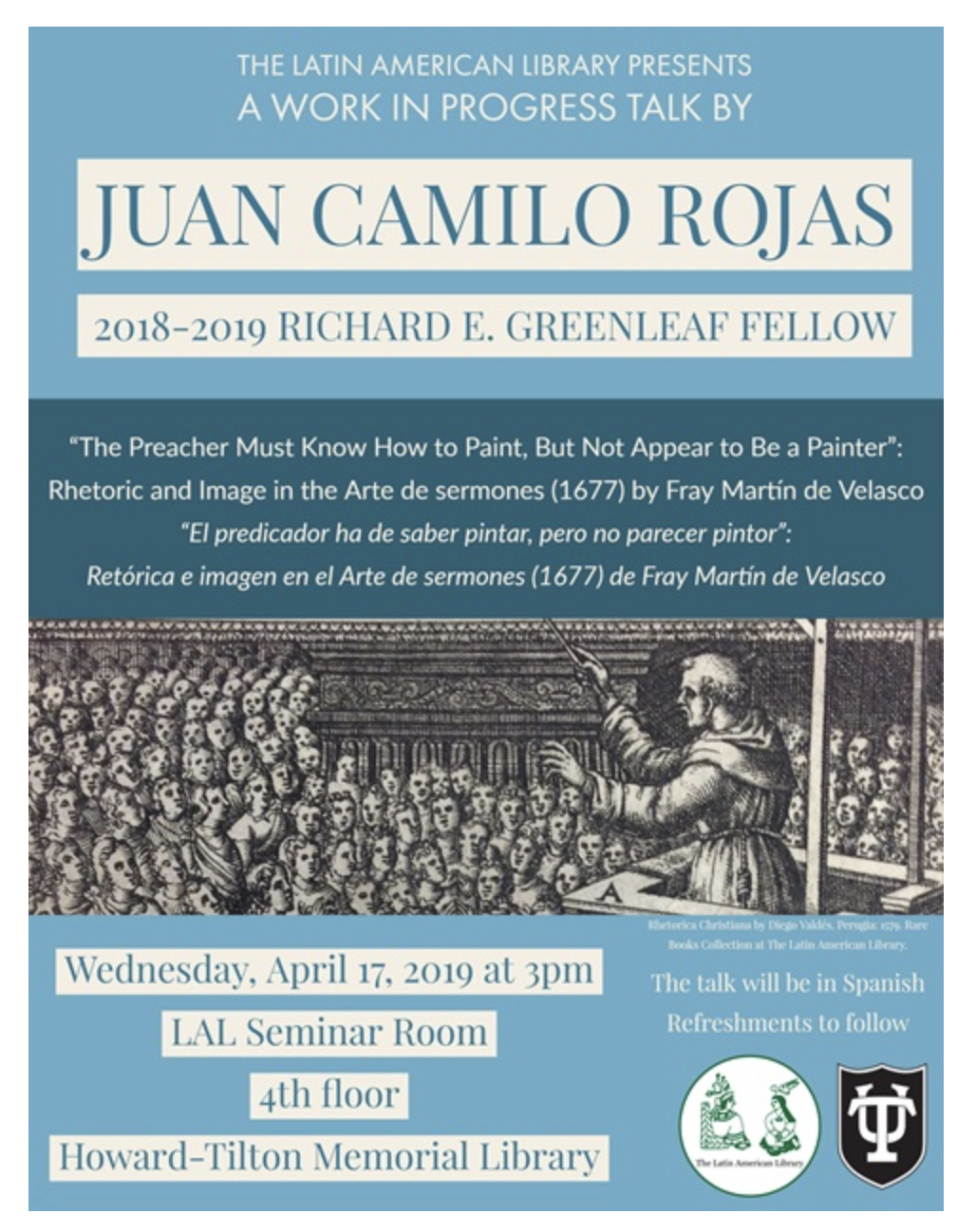
Please join the Latin American Library in welcoming Juan Camilo Rojas. a 2018-2019 LAL Richard E. Greenleaf scholar, who will be giving a work-in-progress talk entitled The Preacher Must Know How to Paint, But Not Appear to Be a Painter: Rhetoric and Image in the Arte de sermones (1677) by Fray Martín de Velasco (El predicador ha de saber pintar, pero no parecer pintor: Retórica e imagen en el Arte de sermones (1677) de Fray Martín de Velasco) on Wednesday, April 17, at 3:00 PM in the Latin American Library seminar room.
The talk will be in Spanish. Refreshments will follow the talk.
Arte de sermones, para saber hazerlos, y predicarlos (The Art of Preaching) was written by Martin de Velasco, a Franciscan friar from the New Kingdom of Granada (present-day Colombia). It was published first in Cádiz, Spain in 1677 and later in Mexico City in 1728. This book was widely used by several religious orders in Spanish America to teach clergymen how to compose and preach sermons. Following the classical and medieval rhetorical traditions, de Velasco established a connection between rhetoric and image, hoping that parishioners who listened to the sermons would form mental images – frequently exemplified in paintings – to be persuaded of religious and political values. This project will study this connection between rhetoric and image and the influence of this book on sermons published in New Spain that the Latin American Library at Tulane University preserves in its Rare Books Collection.
Juan Camilo Rojas is an independent scholar whose work centers on the cultural and intellectual history of the New Kingdom of Granada from the 16th to the 18th centuries. He earned a B.A. in History from the Universidad Nacional de Colombia and an M.A. in History from Universidad de Los Andes (Bogotá), where he was awarded the Germán Colmenares Scholarship. He is the author of articles on the cultural history of images and writing published in journals, books, and exhibition catalogues. He is also the author of Pintura alegórica y diferenciación social: los techos artesonados de Tunja en el siglo XVII (Bogotá: ICANH, 2017). This publication is a recognition of his work as the best M.A. thesis on colonial history in Colombia in 2016, by the Instituto Colombiano de Antropología e Historia (ICANH).
The Richard E. Greenleaf Fellowship Program at the Latin American Library is made possible by a generous gift from the late Richard E. Greenleaf.
About Richard E. Greenleaf (1930-2011)
Until his retirement in 1998, Richard E. Greenleaf served as the France Vinton Scholes Professor of Colonial Latin American History, and as the Director of the Center for Latin American Studies at Tulane University. He also served as Chair of the Department of History. Dr. Greenleaf grew up in Albuquerque, New Mexico, and took his Bachelors, Masters and Doctoral degrees at the University of New Mexico, where he studied under the dean of Inquisition scholars, France V. Scholes. Greenleaf’s doctoral dissertation, Zumárraga and the Mexican Inquisition 1536-1543, served as the basis for his many excellent publications on the history of the Holy Office of the Inquisition in Latin America. Greenleaf authored eleven major scholarly books, co-authored or contributed to seventeen others, and published almost four dozen articles in the field of Latin American and New Mexico history. He was the recipient of many distinguished awards, among them the Silver Medal, the Sahagún Prize (Mexican National History Award), and the Serra Award of the Academy of American Franciscan History for Distinguished Scholarship in Colonial Latin American History. In his long and distinguished teaching career in New Mexico, Mexico City and New Orleans, Greenleaf served as mentor to 34 doctoral students at Tulane, and countless masters and undergraduate students. Richard E. Greenleaf died on November 8, 2011.
